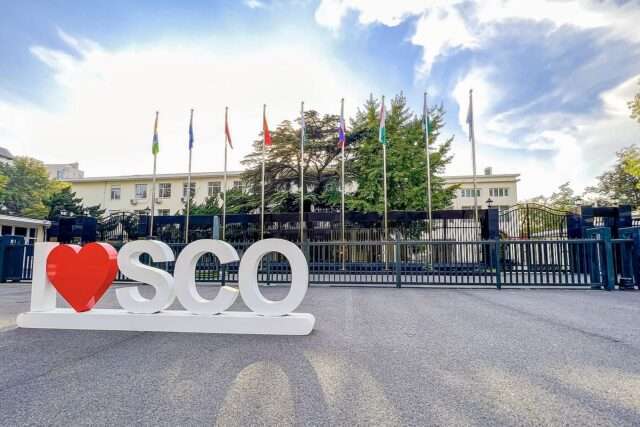
Persian Files ISSN 2975-0598 Volume 9 Issue 1
Author: Silvia Boltuc
Iran signed a memorandum of commitment for its permanent membership in the Shanghai Cooperation Organisation, enhancing its role in the Eurasian chessboard and strengthening the Moscow-Beijing-Tehran axis.
On Wednesday 14th, 2022, the Islamic Republic of Iran signed a memorandum of commitment for Iran’s permanent membership in the Shanghai Cooperation Organisation (SCO) in Samarkand, Uzbekistan. The Secretary General of the SCO stressed that the regional position of the Islamic Republic of Iran as a powerful country with stability and security is essential for the organisation.
Iranian Foreign Minister Hossein Amir-Abdollahian announced the signing of the memorandum in a Twitter post late Wednesday, stating that Iran has entered a new stage of various economic, commercial, transit, and energy cooperation. The Iranian Government approved the document, which is now under Parliament review.
Since its formation in 2001, the SCO had admitted new members only once, when India and Pakistan’s applications were approved at the 2015 summit. Notably, Belarus has also formally applied for full membership.
The geopolitical scenario of the SCO Summit in Samarkand
The two days Sco Summit will kick off in Samarkand, Uzbekistan, on September 15th, 2022. Some of the most important Eurasian leaders will participate in the event, including Russian President Vladimir Putin, Chinese President Xi Jinping, Iranian President Ebrahim Raisi, Indian Prime Minister Narendra Modi, and Turkish President Recep Tayyip Erdoğan. Several essential issues will be discussed in bilateral sideline meetings.
Erdoğan and Putin will discuss the grain export deal, the situation at the Zaporizhzhia power plant in Ukraine, and the Syrian and Libyan conflicts. The official representative of the Office of the President of the Russian Federation, Dmitry Peskov, also announced a meeting between Raisi and Putin. Peskov said that renewed tension between the Republic of Azerbaijan and the Republic of Armenia, which involves Collective Security Treaty (CSTO) ‘s countries, will also be addressed. Following the recent Azeri military aggression, Iran reiterated that changes in the Azerbaijani-Armenian border are unacceptable.
President Raisi will hold a high-level meeting with his Uzbek counterpart after signing 18-23 documents on cooperation in the energy field to address economic topics and regional security issues such as Afghanistan.
Xi Jinping will meet Modi, with whom he has just agreed to withdraw their troops from the Himalayan border, and will attempt to increase China-India ties at the expense of India-US ones.
Finally, Xi Jinping and Putin will discuss the war in Ukraine and other international and regional topics. Notably, China is not part of the international sanctions against Russia, trade between the two countries has continued to grow, and Indian and Chinese imports of Russian oil have soared since the Ukraine Conflict started.
Geopolitical Assessment
SCO members generate a quarter of the world’s Gross Domestic Product (GDP). Since Russia, China, Belarus, and Iran are all under Western sanctions, cooperation in Eurasian formats became vital.
Particularly, China has seen its relations with the West sour in recent months following tensions over self-ruled Taiwan. The Ukrainian Conflict severed Russia’s ties with Europe. As for Iran, the Vienna Talks still fail to achieve a new Nuclear Pact, isolating Tehran from the energy market.
Furthermore, it should be emphasised that more and more Eurasian countries are replacing the dollar with the local currency to trade, as is the case of Turkey-Russia, India-Russia, and Iran-Russia.
This new step towards its full membership will bring Tehran closer to Moscow. Iran and Russia have already deepened their cooperation in several fields, particularly after the events in Ukraine and the sanctions imposed on Russia.
According to the Iranian Oil Minister and co-chairman of the Iran-Russia Joint Economic Commission, Javad Ovji, the trade volume between the two countries has increased significantly in 2022. The goal is to reach $40 billion, while the 2021 figures were $4 billion.
Ahead of Russian President Vladimir Putin’s visit to Tehran on July 19th, 2022, the National Iranian Oil Company and Russian gas producer Gazprom signed a memorandum of understanding worth about $40 billion. Iranian authorities say Gazprom will support Iran in developing the Kish and North Pars gas fields. The two countries increased cooperation also in the military field.
While Western experts believe that the SCO format is weak, the membership process has already strengthened Iran’s economic situation. Tehran has hosted several events dedicated to the commercial benefits of SCO membership. In July, the Islamic Republic of Iran Customs Administration (IRICA) spokesman, Ruhollah Latifi, stated that Iran’s non-oil exports to SCO countries increased 20 per cent in the second quarter of 2022, totalling $5.5 billion.
The SCO membership offers Tehran a diplomatic forum for pursuing closer ties to the Central Asian region. For their part, Central Asian governments see Iran as a potential transit hub. Tehran has developed its ports’ infrastructures which may serve international goods transiting and are included in crucial international corridors: the International North-South Transport Corridor (INSTC) and the Belt and Road Initiative (BRI).
Cooperation with Iran is also essential in the military field. Tehran plays a crucial role in strategic scenarios such as Syria and Afghanistan.
Do you like SpecialEurasia reports and analyses? Has our groundbreaking research empowered you or your team? Now is your chance to be a part of our mission! Join us in advancing independent reporting and unlocking the secrets of Eurasia’s complex geopolitical landscape. Whether through a one-time contribution or a monthly/yearly donation, your support will fuel our relentless pursuit of knowledge and understanding. Together, let’s pave the way for a brighter future. DONATE NOW and secure your place in shaping the geopolitical narrative.
